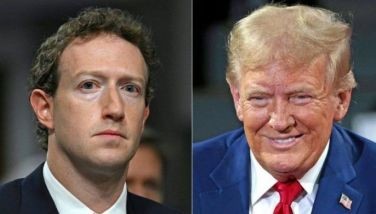Does Phl need an anti-trust law?
After successfully shepherding into law two highly controversial bills namely the reproductive health bill and the tobacco tax bill, Congress’ attention has shifted to two proposed measures, both of which are expected to be equally if not more contentious, namely the anti-trust bill and the divorce bill.
The proposals for anti-trust legislation that have been filed in Congress are basically copycats of US anti-trust laws, foremost of which are the Sherman Anti-Trust Act of 1890 which declared illegal “every contract, combination…or conspiracy in restraint of trade or commerce†and the Clayton Antitrust Act of 1914, as amended in 1936 by the Robinson-Patman Act, which prohibits discrimination among customers through prices or other means, as well as mergers or acquisitions whenever the effect may be “to substantially lessen competition.â€
And of course the US government has had successful prosecutions for violation of US anti-trust laws, namely those against Microsoft, AT&T, Kodak, and Standard Oil. The case against AT&T was settled, resulting in its being split into seven companies, each of which would serve different regions in the US. Today, only three of the seven “Baby Bells†are left – five have merged to become AT&T Inc. and the latter two are now known as Verizon and Qwest.
The case of Kodak is another landmark case in US anti-trust history. “At one point in history, Kodak has controlled as much as 96 percent of the film and camera market in the United States. Through the years, Kodak has seen and weathered several antitrust suits and claims brought by both private and federal parties. The two suits that would shape and reinforce antitrust law in the United States were brought on by the US government in 1921 and in 1954 and would result in two consent decrees. In accordance with the 1921 decree, Kodak agreed to not sell private-label film; it was disbarred from selling film under any other label but its own. In 1954, following the development of its Kodacolor film, Kodak’s became not only the only manufacturer and seller of Kodacolor, it was also the only company that knew how to process the film as well and parlayed that into its business strategy. As part of the purchase cost of Kodacolor, Kodak included a fee that would allow the customer to send in the film for processing and delivery. Accused that the tying together of the film and the finished product constituted a violation of the Sherman Act, Kodak was forced to license the color finishing process to third parties. In 1994, citing changing international economic conditions, both consent decrees were terminated.†(http://www.hg.org/article.asp?id=6025)
Meanwhile, the case against Standard Oil is a major one in antitrust case law for two simple reasons. First, it broke up a massively profitable and innovative corporation into 34 separate, competing companies. Secondly, the application and upholding of the Sherman Act by the Supreme Court created the vital precedent for all future cases to be prosecuted under. The Standard Oil verdict may have acted as an impetus for the drafting and creation of the Clayton Anti-Trust Act, which is seen by many as a vast improvement and refinement of US antitrust law. Today, ExxonMobil can trace its existence as a direct descendant of Standard Oil, having merged with multiple Standard Oil descendants to become one the largest and richest corporations in the world. In the 2007 fiscal year, ExxonMobil reported an income of $40 billion.â€
And of course, who would not know about the case filed by the US government against Microsoft Corp. for violating the Sherman Act? The case basically questioned Microsoft’s bundling of its Internet Explorer web browser software with its Microsoft Windows operating system. The US justice department would later settle the case with Microsoft. The settlement required Microsoft to share its application programming interfaces with third-party companies and appoint a panel of three people who would have full access to Microsoft’s systems, records, and source code for five years to ensure compliance. However, the DOJ did not require Microsoft to change any of its code nor prevent Microsoft from tying other software with Windows in the future.
In a number of resolved or settled anti-trust cases in the US, the consumers and the businesses affected do not appear to have been better off after the alleged monopoly or combination in restraint of trade has been dismantled.
The late George Stigler, who received the Nobel Prize for economics in 1982, noted in an article that antitrust policy is expensive to enforce. “The Antitrust Division of the Department of Justice had a budget of $133 million in 2004, and the Federal Trade Commission’s budget was $183 million. The defendants (who also face hundreds of private antitrust cases each year) probably spend 10 or 29 times as much. Moreover, antitrust is slow moving. It takes years before a monopoly practice is identified, and more years to reach a decision; the antitrust case that led to the breakup of the American Telephone and Telegraph Company began in 1974 and was under judicial administration until 1996.â€
And of course, we have what economists refer to as natural monopolies which Stigler defined as industries, usually utilities, in which the market can support only one firm at the most efficient size of operation. “Many economists believe that the distribution of electric power (but not the production of it) is an example of a natural monopoly. The economies of scale exist because another firm that entered would need to duplicate existing power lines, whereas if only one firm existed, this duplication would not be necessary. And one firm that serves everyone would have a lower cost per customer than two or more firms,†according to economist David Henderson. Many economists prefer to deal with natural monopolies via government regulation.
Monopolies, unlike combinations in restraint of trade, are not prohibited per se under the Philippine Constitution. It is only when public interest requires that is prohibited.
US anti-trust laws have been criticized over the years for their alleged failure to achieve their purpose. And what is this purpose? Is it to protect the consumer or to encourage competition? The danger of copying US anti-trust laws is that these laws do not reflect the situation in the Philippines. Any piece of anti-trust legislation should be rooted in history, just like in the US.
And why the rush to have an anti-trust law in the Philippines? True, our country has businesses that account for majority of the market share in their respective industries, but does this mean that they are not subject to real competition? Are we supposed to penalize efficient businesses and reward inefficient ones? Is having significant market share that bad that government needs to put a limit to it? Does the Philippines have such a huge market to justify several industry players? Better safe than sorry.
For comments, email at [email protected].
- Latest
- Trending
































